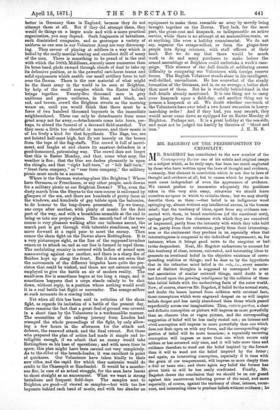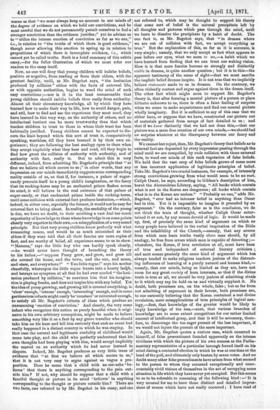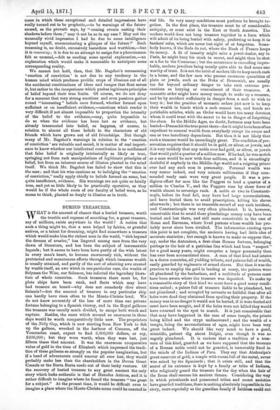MR. BAGEHOT ON THE PREDISPOSITION TO CREDULITY.
MR. BAGEHOT has contributed to the new number of the Contemporary Review one of his subtle and original essays on a subject which, as he truly says, has been too much neglected by those who have written upon the laws of thought and evidence, —namely, that element in conviction which is not due to laws of thought and evidence at all, but to causes which he regards as in most cases independent of even the appearance of evidence. We cannot profess to summarize adequately the positions taken in this very able essay, otherwise we should leave ourselves no space iu which to criticize them ; but we may shortly describe them as these :—that belief is an indigenous weed springing up, almost without any intellectual excuse, in the human mind ; that the tendency of ideas, apart from any evidence con- nected with them, to breed convictions (of the emotional sort), springs partly from the clearness with which they are conceived or impressed, partly from the intensity with which they take hold of us, partly from their reiteration, partly from their interesting- ness or the excitement they produce in us, especially when that interestingness is congenial to the individual temperament., as, for instance, when it brings good news to the sanguine or bad. to the despondent. Next, Mr. Bagehot endeavours to account for this tendency of clear, intense, reiterated, and interesting ideas to generate an irrational belief in the objective existence of corre- sponding realities or things ; and he does so by the hypothesis that in the infantine mind belief is the rule, i.e., every associa- tion of distinct thoughts is supposed to correspond to some real association of similar outward things, until doubt is at last forced upon the growing intelligence by the collision of these false initial beliefs with the undeceiving facts of the outer world. Now, of course, observes Mr. Bagehot, if belief be the normal state, and doubt the lesson learned from collision with external fact, those conceptions which were engraved deepest on us will inspire beliefs deeper and leas easily abandoned than those which passed superficially across our imaginations. Thus, exteris paribus, a clear and definite conception or picture will impress us more powerfully than an obscure idea or vague picture, and the corresponding suggestion of belief will be less easily rooted out ; an intense and vivid conception will impress us more powerfully than one which does not flash upon us with any force, and the corresponding sug- gestion of belief will be more tenacious ; a repeatedly recurring conception will impress us more than one which recurs only seldom or has occurred only once, and it will take more time and evidence therefore to weed out the belief inspired by the former than it will to weed out the belief inspired by the latter ; and again, an interesting conception, especially if it runs with the grain of our temperament, will impress us more deeply than a dull or tame one ; and there again any belief the former has given birth to will be less easily eradicated. Finally, Mr. Bagehot draws the conclusion that we should be on our guard against this omnivorous believing power of the mind, and more especially, of course, against the tendency of clear, intense, recur- rent, and interesting ideas to produce beliefs without evidence ; he warns us that "we must always keep an account in our minds of the degree of evidence on which we hold our convictions, and be most careful that we do not permanently permit ourselves to feel a stronger conviction than the evidence justifies ;" yet he advises us to "utilize the intense emotion of conviction as far as we can," i.e., in relation to "the truths of which there is good evidence," though never allowing this emotion to spring up in relation to propositions of which there is incomplete evidence, i.e., which cannot yet be called truths. Such is a brief summary of this subtle essay,—for the fuller illustration of which we must refer our readers to the essay itself.
Now, no one will deny that young children will imbibe beliefs, positive or negative, from reading or from their elders, with the greatest facility, until, as Mr. Bagehot says, " the hesitation produced by collision" either with the facts of external life, or with opposite authorities, begins to weed the mind of such easy convictions ;—nor is it in the least unreasonable that young children should imbibe beliefs thus easily from authority. Almost all their elementary knowledge, all by which they have learned how to make their way in life, how to avoid danger, pain, and evil, how to find and use the experience they most need, they have learned in this very way, on the authority of others, and no intellectual instinct can be more trustworthy than that which teaches children to trust to those in whom their trust has been habitually justified. Young children cannot be expected to dis- cern the limit beyond which this sort of trust is, comparatively speaking, worthless, till they have learned it by their own ex- perience; they are following the best analogy open to them when they accept implicitly what they hear and read, till they begin to find how great the collision of authority with authority, and of
authority with fact, really is. But to admit this is very different, indeed, from admitting Mr. Bagehot's principle that " at first we believe all which occurs to us ;" in other words, that any impression on our minds immediately suggests some corresponding reality outside of us, so that if, for instance, a palace of sugar- candy presents itself to a young child's imagination, or the fancy that its rocking-horse may be an enchanted prince flashes across its mind, it will believe in the real existence of that palace of sugar-candy, or that enchanted prince inside the rocking-horse, until some collision with external fact produces hesitation,—which, indeed, in either case, especially the former, it would not be easy for external fact to bring about. In reality, the credulity of the young is due, we have no doubt, to their ascribing a vast deal too much superiority of knowledge to those whose knowledge is on some points clearly very superior to their own,—a misapplication of a very sound principle. But that very young children know perfectly well what romancing means, and would be as much astonished as their elders if they were told that all their fancies are mere copies of fact, and are worthy of belief, all experience seems to us to show. " Mamma," says the little boy who can hardly speak clearly, —he would never have thought of broaching the theory to his father,—" suppose Pussy grew, and grew, and grew till she covered the house, and the town, and the sun, and moon, and stars, and everywhere !" " You little rogue !" says his mother cheerfully, whereupon the little rogue bursts into a hearty laugh, and betrays no symptom at all that he had ever needed " the hesi- tation produced by collision," to convince him that his imagina- tion is playing freaks, and does not inspire him with any belief. Yet the idea of pussy growing, and growing till it covered everything, is 4vlear' enough, intense' enough, ' interesting' enough, and in some pertinacious infants might easily be 'constant ' or reiterated enough, to satisfy all Mr. Bagehot's criteria of ideas which produce an unreasoning emotion of conviction.' And clearly, the very same infant who recognizes this notion as purely fanciful when it origi- nates in his own arbitrary conceptions, might be made to believe something very like it as a fact by any grave traveller who should take him on his knee and tell him seriously that such an event had really happened in a distant country in which he was staying. In that case the natural and legitimate credulity of childhood would come into play, and the child who perfectly understood that his own thoughts had been playing with him, would accept implicitly the marvel on an authority which he had never learned to dispute. Indeed, Mr. Bagehot produces so very little trace of evidence that " at first we believe all which occurs to us," that it is not very easy to argue against so vague a pro- position. Does he mean that a child with an ear-ache ' be- lieves' that there is anything corresponding to the pain out- side him ? If not, why should he suppose that a child with a fanciful thought or picture in its mind believes' in anything corresponding to the thought or picture outside him ? There are two facts, one referred to by Mr. Bagehot in his essay, and one
not referred to, which may be thought to support his theory that some sort of belief is the natural precipitate left by all thoughts and pictures which pass through the mind, until we learn to dissolve the precipitate by a habit of doubt. The one fact is, as Mr. Bagehot says, that " in dreams where we are out of collision with fact, we accept everything as true." But the explanation of this, so far as it is accurate, is very simple ; namely, that we only accept as fact what appears to pass before our eyes, what we seem to see, —a habit which we have learned from finding that we can trust our waking vision. How it is that mere fancies become so strongly and distinctly visible in dreams, is quite another question ; but it is to this—the apparent testimony of the sense of sight—that we must ascribe the implicit belief dreams inspire. It is not true that we implicitly believe statements made to us in dreams. On the contrary, we often violently contest and argue against them in the dream itself. The other fact which might seem to support Mr. Bagehot's theory is, that after forming a mental picture of a person or place hitherto unknown to us, there is often a faint feeling of surprise when we come to make acquaintance and find our mental picture wholly imaginary. But it is sufficient to say of this case that we either have, or suppose that we have, constructed our picture out of materials gathered from scraps of fact detailed to us ; and that if we knew distinctly that we had not done this,—that our picture was a mere free creation of our own minds,—we should feel no surprise whatever at the discrepancy between our fancy and the reality.
We cannot but reject, then, Mr. Bagehot's theory that beliefs as to external fact are deposited by every impression passing through the mind until we are compelled, by rude collision with those external facts, to weed our minds of this rank vegetation of false beliefs. We hold that the vast crop of false beliefs grows of some more or less incorrect application of legitimate principles of belief. Take Mr. Bagehot's two crucial instances, for example, of intensely strong convictions growing from what would seem to be no root. Caliph Omar, he says, according to Gibbon's description of him, burnt the Alexandrine Library, saying, " All books which contain what is not in the Koran are dangerous ; all books which contain what is in the Koran are useless." "Probably no one," adds Mr. Bagehot, "ever had an intenser belief in anything than Omar had in this. Yet it is impossible to imagine it preceded by an argument." On the contrary, false as is the conclusion, we do not think the train of thought, whether Caliph Omar enter- tained it or not, by any means devoid of logic. It would be made up, first, of precisely the same kind of argument on which so many people have believed in the verbal inspiration of the Bible and the infallibility of the Church,—namely, that any source from which men learn truths vastly above man should, by all analogy, be free from errors which man is capable of detecting ;— wherefore, the Koran, if true revelation at all, must have been all true and independent of external literary criticism ; and next comes precisely the same kind of argument which has always tended to make religious teachers jealous of the distract- ing influences of learning of a purely natural and human kind,— namely, that our minds, being so limited as they are, have not room for any great variety of keen interests, so that if the divine truth is true at all, we should be very jealous of admitting rivals to it which may sap its hold on us and virtually supplant it. No doubt, both premisses are, on the whole, false ; but so far from not admitting of argument in their favour, both premisses are, to one earnestly believing that the Koran contained a real divine revelation, mere misapplications of true principles of logical ana- logy,—first, that knowledge of the greater would be likely to imply knowledge of the less,—next, that various branches of knowledge are to some extent competitors for our rather limited amount of intellectual grasp, and that it will be necessary, there- fore, to discourage the too eager pursuit of the less important, if we would not injure the pursuit of the more important.
Again, Mr. Bagehot quotes a curious case, which occurred to himself, of false presentiment founded apparently on the intense vividness with which the picture of his own success as the Parlia- mentary representative of a particular borough forced itself on his mind during a contested election in which he was at one time at the head of the poll, and ultimately only beaten by seven votes. And no doubt many other false presentiments have arisen from what seemed to the person to whom they occurred exceptionally and unac- countably vivid visions of themselves in the act of occupying some situation in life which they have never yet occupied. But this seems to us to be referable to reasoning of the following kind It is very unusual for me to have these distinct and detailed impres- sions of scenes which have not really occurred ; I have read of cases in which these exceptional and detailed impressions have really turned out to be prophetic,—to be warnings of the future caused, as the proverb says, by " coming events casting their shadows before them ;" may it not be so in my case ? May not the unusually vivid impression I had be due to some intelligence beyond myself, communicating a glimpse of the future ?' Such reasoning is, no doubt, excessively hazardous and worthless,—but it is reasoning; it is due to an attempt to assign for a phenomenon felt as unusual,—felt as needing some special explanation,—an explanation which would make it reasonable to anticipate some corresponding reality.
We cannot but hold, then, that Mr. Bagehot's unreasoning emotion of conviction' is not due to any tendency in the human mind which produces prolific crops of illusions out of all the accidental combinations of ideas and images that float across it, but rather to the inexperience which pushes legitimate principles of belief beyond their true limits. Of course, we do not deny for a moment that very strong emotions and even passions gather round " interesting " beliefs once formed, whether formed upon sufficient or on insufficient evidence,—emotions which render it very difficult if not almost impossible to proportion the intensity of the belief to the evidence,—nay, quite impossible to do so when the evidence has been lost as evidence, but already transmuted into belief, as happens, of course, in relation to almost all those beliefs in the characters of old friends which have grown out of old friendships. But though many of Mr. Bagehot's warnings in relation to the ' emotion of conviction' are valuable and sound, it is matter of real import- ance to know whether our intellectual constitution is so malformed that false belief is originally intrinsically as likely as true, springing not from rash manipulations of legitimate principles of belief, but from an inherent source of illusion planted in the mind itself. We think Mr. Bagehot has failed to show that this is the case ; and that his wise cautions as to indulging the " emotion of conviction," really apply chiefly to beliefs formed on some, but quite insufficient, evidence. His warnings are not quite so fatally true, and yet so little likely to be practically operative, as they would be if the whole roots of our faculty of belief were, as he seems to think, planted as deeply in illusion as in truth.




































 Previous page
Previous page